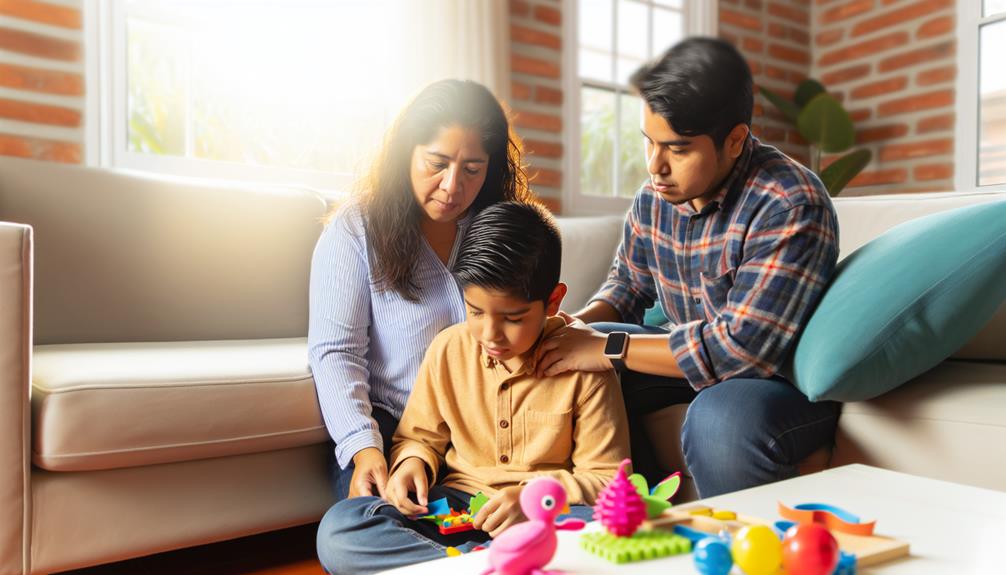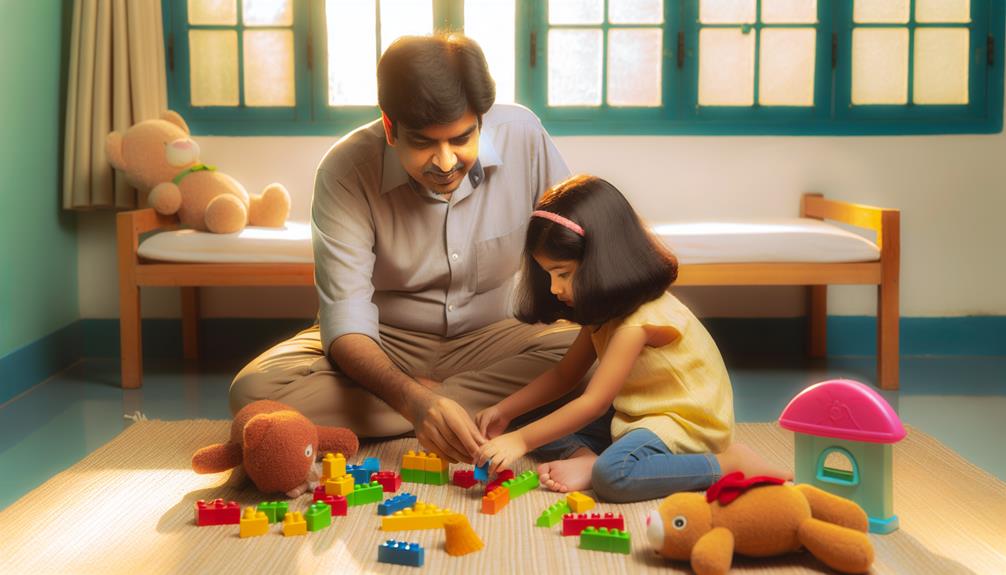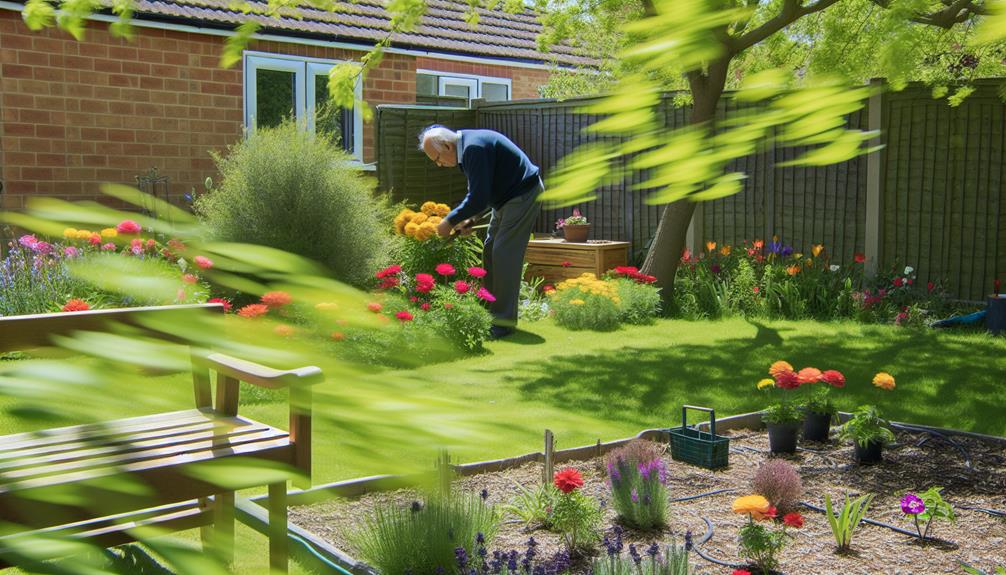Parenting a child with ADHD can be particularly challenging, often leading to frustration. Understanding that ADHD behaviors stem from neurological differences can foster empathy. Establishing a structured routine helps mitigate daily disruptions. Active listening enhances communication, letting your child feel valued. Mindfulness techniques, such as deep breathing, can cultivate patience, while humor and gratitude journaling shift focus from stress to appreciation. Building a support network offers valuable shared experiences and resources, reinforcing the importance of community. By implementing these strategies, caregivers can transform frustration into relatable learning opportunities, paving the way for deeper connection and understanding within the family.
Key Takeaways
- Establish a structured routine to create stability, reducing anxiety and behavioral disruptions in children with ADHD.
- Practice active listening to validate your child's feelings and enhance communication, fostering trust and understanding.
- Utilize mindfulness techniques, such as mindful breathing, to cultivate patience and improve emotional responses during challenging moments.
- Engage in positive reinforcement to acknowledge your child's efforts, boosting their self-esteem and encouraging desirable behaviors.
- Seek support from local parenting networks and resources to share experiences and strategies, reducing feelings of isolation for caregivers.
Understanding ADHD Behaviors

Understanding ADHD behaviors is essential for parents seeking to navigate the complexities of raising a child with Attention Deficit Hyperactivity Disorder. ADHD symptoms often manifest in various ways, including impulsivity, hyperactivity, and difficulties with attention. Recognizing these behaviors is the first step toward fostering a supportive environment that nurtures the child's unique needs. In today's digital age, utilizing resources and communities online can provide valuable insights and strategies for managing ADHD effectively, including best online platforms for business success.
Behavior triggers can vary considerably from one child to another, influenced by factors such as environment, emotional state, and social interactions. For instance, a child may exhibit increased impulsivity in chaotic settings or struggle to focus during stressful situations. Parents must learn to identify these triggers to better anticipate and manage their child's behaviors.
Empathy plays a critical role in this journey. Understanding that these behaviors are not intentional mischief but rather manifestations of a neurological condition can help parents respond more effectively. Open communication and patience are essential in establishing a trusting relationship, allowing the child to feel understood and accepted. By fostering a sense of belonging, parents can empower their children to thrive despite the challenges associated with ADHD, ultimately leading to improved emotional and behavioral outcomes.
Common Parenting Challenges
Parenting a child with ADHD presents unique challenges that can test even the most resilient caregivers. One notable hurdle is managing behavioral expectations. Children with ADHD often struggle to meet societal norms, leading to frustration for both parents and the child. This misalignment can create a cycle of criticism and disappointment, further exacerbating the child's feelings of inadequacy and impacting their self-esteem. As seen in the journey of public figures like Katy Mixon, embracing one's individuality and finding confidence can play a vital role in overcoming such challenges and fostering resilience in children. Additionally, Katy Mixon's inspiring journey serves as a reminder that self-acceptance can greatly enhance a child's ability to navigate difficulties.
Additionally, sibling dynamics can become strained in families with ADHD. Siblings may feel neglected or resentful due to the extra attention their ADHD sibling requires. This can lead to jealousy and behavioral issues among siblings, as they may feel their needs are overlooked. Parents often find themselves in the difficult position of balancing their attention, working to guarantee that all children feel valued and heard.
Recognizing these common challenges is the first step toward fostering a more harmonious family environment. By understanding the complexities of ADHD, caregivers can work towards developing strategies that address behavioral expectations while nurturing positive sibling relationships, cultivating a sense of belonging for each child within the family unit.
Strategies for Managing Frustration

Steering through the complexities of ADHD can often lead to heightened frustration for both children and their caregivers. Understanding specific frustration triggers is essential in guiding these challenging moments, especially as caregivers adapt to new strategies for support unlocking remote customer service roles. Identifying these triggers allows caregivers to implement effective coping mechanisms that foster a supportive environment.
Here are three strategies to manage frustration effectively:
- Create a Structured Routine: Establishing a consistent daily schedule can minimize unexpected disruptions, reducing anxiety for both the child and caregiver.
- Practice Active Listening: Taking the time to truly hear your child's concerns can validate their feelings, fostering a sense of belonging and reducing tension.
- Utilize Breaks: Encourage short breaks during challenging tasks. This can help both the caregiver and child regroup emotionally and mentally, allowing for a smoother shift back to the task at hand.
Implementing these strategies can transform frustration into an opportunity for connection and understanding. By recognizing and addressing frustration triggers with thoughtful coping mechanisms, caregivers can cultivate an environment that nurtures resilience and emotional well-being for both themselves and their children.
Building Patience Through Mindfulness
Building patience in the context of ADHD can be greatly enhanced through the practice of mindfulness. Mindfulness techniques, such as mindful breathing, help caregivers anchor themselves in the present moment, allowing them to respond thoughtfully rather than react impulsively. This practice fosters a sense of calm, which is essential when managing the challenges that ADHD presents. Additionally, incorporating humor into daily interactions can lighten the mood; after all, laughter can be a powerful antidote to frustration, as seen in hilarious tweets from women.
Incorporating gratitude journaling into daily routines can further support the development of patience. By reflecting on positive experiences, caregivers can shift their focus from frustration to appreciation, cultivating a more compassionate mindset. This shift not only benefits the caregiver but also creates a nurturing environment for the ADHD child, promoting emotional resilience.
Moreover, practicing mindfulness encourages caregivers to embrace their feelings without judgment. This acknowledgment of emotions fosters a deeper understanding of personal triggers, allowing for more effective management of stressful situations. By consistently engaging in these practices, caregivers can build a reservoir of patience that transforms their interactions with their children.
Ultimately, embracing mindfulness techniques can create a supportive atmosphere, fostering connection and belonging for both caregivers and children. In this shared journey, patience becomes not just a goal but a powerful tool for nurturing growth and understanding.
Effective Communication Techniques

Effective communication techniques are essential for fostering understanding and connection between caregivers and children with ADHD. Establishing a dialogue that resonates with your child can greatly enhance their engagement and emotional well-being. As noted in the evolving landscape of creative expression, AI's influence on music highlights the importance of adapting communication methods to cater to individual needs. Here are three effective strategies to strengthen your communication:
- Active Listening: Show genuine interest by maintaining eye contact and nodding to demonstrate that you are fully present. Reflecting back what your child says can validate their feelings and encourage openness.
- Positive Reinforcement: Acknowledge and celebrate your child's efforts and achievements, no matter how small. This boosts their self-esteem and motivates them to communicate more effectively with you.
- Clear and Concise Instructions: Children with ADHD often benefit from straightforward communication. Use simple language and break tasks into manageable steps, ensuring clarity and reducing frustration.
Seeking Support and Resources
Steering through the complexities of parenting a child with ADHD often requires additional support and resources that can empower both the child and the caregiver. Building connections within parenting networks can be invaluable, offering a sense of belonging and understanding. These networks often lead to local support groups where parents share experiences, strategies, and encouragement, fostering a community that alleviates feelings of isolation.
Educational resources tailored to ADHD can enhance your understanding of the condition and its challenges. Online forums serve as platforms for exchanging ideas and solutions, allowing parents to access a broader community of individuals facing similar situations. Engaging in these discussions can illuminate effective coping mechanisms and insights.
Exploring various therapy options, including cognitive-behavioral therapy, can provide tailored strategies that support the child's development. Additionally, participating in local workshops can offer practical tools and techniques for managing daily challenges. Embracing these resources is not only a proactive step towards effective parenting but also an essential journey towards building resilience and fostering a nurturing environment for both the child and the caregiver. Remember, you are not alone; support is available, and seeking it is a strength.
Frequently Asked Questions
What Are Some Signs My Child May Have ADHD?
Identifying potential signs of ADHD in a child involves observing certain attention signs and behavior patterns. Common indicators include difficulty sustaining attention, impulsive actions, excessive fidgeting, and challenges in organizing tasks. Additionally, children may struggle to follow instructions and frequently interrupt others. If these behaviors persist and affect daily functioning, it may be beneficial to seek professional evaluation. Understanding these signs can help caregivers provide appropriate support and foster a nurturing environment.
How Can I Help My Child Make Friends?
Helping your child make friends involves fostering social skills through various strategies. Encourage participation in group activities where shared interests can spark connections. Implement playdate strategies, such as structured games, to facilitate interaction in a comfortable setting. Additionally, teach communication techniques that promote confidence, such as making eye contact and initiating conversations. By providing opportunities for engagement, you can help your child develop meaningful relationships, enhancing their sense of belonging and emotional well-being.
Are There Specific Diets That Help ADHD Symptoms?
Research suggests that certain dietary interventions may positively influence ADHD symptoms. Nutrition strategies focusing on omega-3 fatty acids, antioxidants, and whole foods can support cognitive function and emotional regulation. Additionally, some studies indicate that reducing processed sugars and artificial additives may benefit individuals with ADHD. While no specific diet guarantees improvement, a balanced and nutrient-rich eating plan may foster better focus and behavior, creating an environment that nurtures belonging and emotional well-being.
When Should I Consider Medication for My Child?
Determining when to evaluate medication for a child involves careful assessment and understanding of their specific needs. It is essential to engage in a thorough consultation process with a healthcare professional who specializes in ADHD. They can provide insights into various medication options, weighing potential benefits against possible side effects. Additionally, it is crucial to take into account the child's overall well-being and how medication may fit into an all-encompassing management plan for their symptoms.
How Can I Talk to Teachers About My Child's Needs?
Effective communication strategies are essential when discussing your child's needs with teachers. Begin by scheduling a dedicated meeting to foster an environment conducive to collaboration. Clearly articulate your child's strengths and challenges, and provide specific examples to illustrate their needs. Encourage open dialogue, inviting the teacher to share observations and insights. Establishing a partnership rooted in understanding can greatly enhance support for your child's educational experience, promoting a sense of belonging within the school community.





